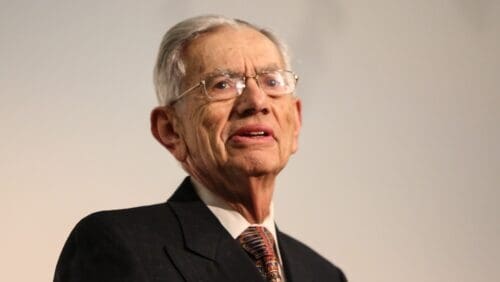MaNishma with Rabbi Arnold Goodman
Parshat Ekev
Eat, Be Satisfied, and Bless
By Rabbi Arnold Goodman
Senior Rabbinic Scholar

And you shall eat and be satisfied and bless the Lord your God for the good land which He has given you (Deuteronomy 8:10).
This commandment is the basis of the Birkat HaMazon, [Grace after Meals]. The exact wording of this prayer was crafted by the Rabbis during the early days of the Talmudic era. They composed three blessings: for the food, for the good land [Eretz Yisrael] and for the holy city of Jerusalem.
Rabbi Nachman, a Fourth Century scholar who resided and taught in Babylon, contended that each of these blessings was ordained by a different Biblical personality in response to a specific historical event. The first morning that the manna fell from Heaven, Moses ordained the blessing over food concluding with the words, "Blessed art Thou Ado-nai, ha-zan et ha'kol" (who feeds all).
The second blessing was ordained by Joshua after he led the Children of Israel into Eretz Yisrael and concludes, "Blessed art Thou Ado-nai, al ha'aretz v'al ha'mazon" (for the Land and for the food).
The third blessing was ordained by David after he established Jerusalem as the capitol of Eretz Yisrael and concludes, "Blessed art Thou Ado-nai, boneh b'rachamav Yerushalayim, Amen" (Who in His mercy builds Jerusalem, Amen).
By associating the first blessing with the miraculous manna that sustained our ancestors in the desert, the Rabbis emphasized that the very existence of food is a miracle. We recite the grace after meals only if we have eaten what has been harvested from the earth and then transformed into bread. The process that begins with the sowing of the seeds requires tending the fields, harvesting the grain, grinding the flour and baking the bread is made possible through the combined efforts of many. There is a dimension of the miraculous in the human capacity for inter-dependence that brings into being not only the bread that nurtures us physically, but human progress in virtually every field of endeavor. Thus, while God is the ultimate source of our sustenance, the joining of the efforts of many enables us to harness the many blessings that flow from the Divine.
Yet to harvest the grain, we must have fields; we need land. The second blessing therefore affirms God's gift of Eretz Yisrael to our ancestors and to their descendants. Jews lived in different places and were often economically marginal during the close to two thousand years of exile, yet they continued to bless God for the gift of the Land. This constant reference to our relationship with Eretz Yisrael ultimately set into motion the Zionist Movement that in 1948 brought the State of Israel into being. It is significant that the first chalutzim (pioneers) dedicated themselves to work the Land; they sought to be farmers who would produce their own food.
Yet possession of the Land and the ability to provide for our physical well-being dare not be enough for us. "Man does not live by bread alone" reflects a spiritual need. Even as we provide for our bodies, we are commanded to nurture our souls. God's presence in the midst of Am Yisrael and in the life of each of us is symbolized by the reference to Jerusalem and the Holy Temple
Hence the teaching that if three people break bread together but do not recite any words of Torah, it is as if they have brought a sacrifice on the altar of the dead. In a figurative sense we are spiritually dead if we do not strive to see beyond our physical needs and our physical survival. We thank God best for our blessings when we make the effort to share our well being with others who suffer from homelessness and starvation.
As we gather at our tables, may we be grateful to God for the blessing of our food. As we read about Israel may we be appreciative of our People's return to the Land and resolve to set foot there, if not as residents, then as tourists and visitors. As we share in our bread may we be mindful of the demands placed upon us as spiritual beings to see beyond the physical gratifications that are thankfully our lot.
—
From the holy city of Jerusalem, my best wishes for a Shabbat Shalom u'Mevorach, a Shabbat of peace and of blessing.






























